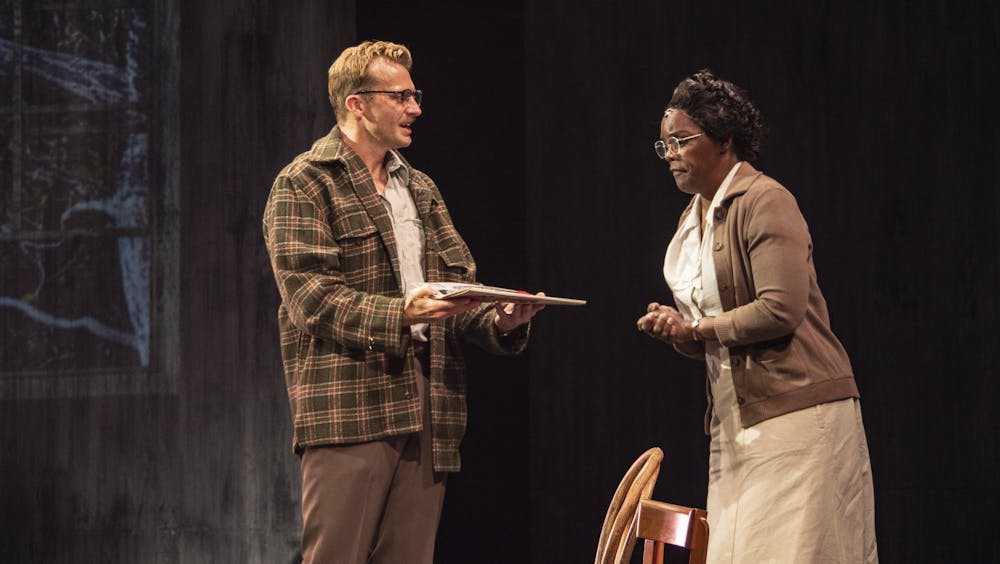Pre-Broadway premiere of ‘Miss Maude’ is changing the status quo

Playwright Martin Casella first discovered photojournalist W. Eugene Smith’s photographs of nurse-midwife Maude Callen in a museum. Incredibly moved by her story, Casella wrote the play “Miss Maude” to dramatize the meeting of Smith and Callen. Performed by the A.D. Players at the George Theater through Oct. 23, “Miss Maude” should reach Broadway by spring 2023 through the play’s projected funding, according to producer Bruce D. Long.
The play examines racial tensions between the two protagonists and their different interactions with folks in rural South Carolina. Smith (Robert Eli) is a famous photojournalist for LIFE magazine who has covered many events around the world, notably during World War II, but nevertheless comes from a middle-class, white background. On the other hand, Callen (Rosalyn Coleman) is a Black nurse midwife from rural South Carolina who transformed her community by delivering babies and nursing ill patients who could not otherwise access proper healthcare.
“I like writing stories about people who like changing the status quo and try to go out of their way to make the world a better place,” Casella said. “And that’s not always easy, but I always try to do it with humor and sensitivity.”
This overwhelming optimism pervades the entire production even during its grimmer moments. Despite their differences, Callen and Smith’s friendship — from their rapidfire banter to their caring nature — is the emotional core of the play.
“I found some letters that [Maude] had written to [Eugene],” Casella said, “Some of which [are] in the play. And she had a very clean, clear voice. One of the actors said to me the very first day of rehearsal, ‘Boy, you really don’t like adjectives or adverbs.’ And I’m like, ‘No, most people don’t use them in real life.’ And she didn’t.”
Casella conducted research for the play in rural South Carolina, where he interviewed Callen’s adopted son, Sinclair (Jeremiah Packer), and a group of older Black midwives who knew Callen.
“[The midwives] told me lots of stories and [how] Miss Maude talked,” Casella said. “[In] the play, she would always call [Eugene] ‘crazy man,’ and she does it so much that near the end of the play, he says that and the audience laughs because they’ve heard it for the last two hours.”
For Casella and Long, drawing audience laughter and tightening the dialogue was critical. To fine-tune the script, the cast and production crew modified scenes through live readings and test performances.
Coleman’s sharp delivery and range bring Callen’s intellectual wit and her fierce stubbornness to the stage, while Eli’s emotional performance draws sympathy to Smith’s alcoholism and failing relationship with his family. As a producer, Long believes the strength of this play is that neither Callen nor Smith are presented as saints.
“I think that’s part of the beauty of this particular script,” Long said. “Maude says it towards the end of the play, [which is] that these blessings and these curses all get mushed up together, and I think that’s emblematic of these people.”
Despite the hard work that the cast invested into the production, it almost didn’t happen due to an investor’s reluctance to fund a play that explored racial tensions.
“There was a fairly significant investor who thought he might want to fund the entire piece and then definitely got cold feet because of the Black Lives Matter movement, and he was afraid of cancel culture,” Long said. “Perception-wise, you’ve got a white guy financing a play about a Black woman, and he was deeply concerned by how the optics would read.”
Despite others’ reservations, the timing of the Black Lives Matter movement was what motivated Long to produce this project.
“I can remember clearly being in Charlotte and marching down the streets with a lot of other people,” Long said. “I don’t want to over-spiritualize it, but, much like Maude, I just felt like saying, ‘Now is the perfect time, we gotta do this because this is what the movement is all about: racial reconciliation, people coming together [and] working together for a common goal.’ This play really embodies the spirit of why we are marching in the streets.”
More from The Rice Thresher

Study Abroad Photo Contest spotlights global experiences
For the first time since the Covid-19 pandemic, students gathered in the Ley Student Center to celebrate global experiences through photography.

Review: "The Crux" Should Redefine Djo
Joe Keery’s work has been boiled down to Steve Harrington from “Stranger Things,” but this label shouldn’t define his 10 years in the entertainment industry. Keery, under his stage name “Djo", is the voice behind the TikTok hit “End of Beginning,” which was released with his album “DECIDE” in 2022 and climbed the charts for the first time in 2024. With “The Crux”, Keery’s third album, he tries to separate his work as Djo and an actor, evidenced by the album’s visual of Keery escaping a building.

Review: “Lonely People With Power” merges blackgaze fury with dreamy introspection
Fifteen years into a storied career that’s crisscrossed the boundaries of black metal and shoegaze, Deafheaven has found a way to once again outdo themselves. “Lonely People With Power” feels like a triumphant return to the band’s blackgaze roots, fusing massive walls of guitar-driven sound with whispery dream-pop interludes, recalling their classic album trio of the 2010s (“Sunbather,” “New Bermuda” and “Ordinary Corrupt Human Love”). It also bears the learned refinements of “Infinite Granite,” the 2021 album where they dabbled more boldly in cleaner vocals and atmospheric passages.

Please note All comments are eligible for publication by The Rice Thresher.